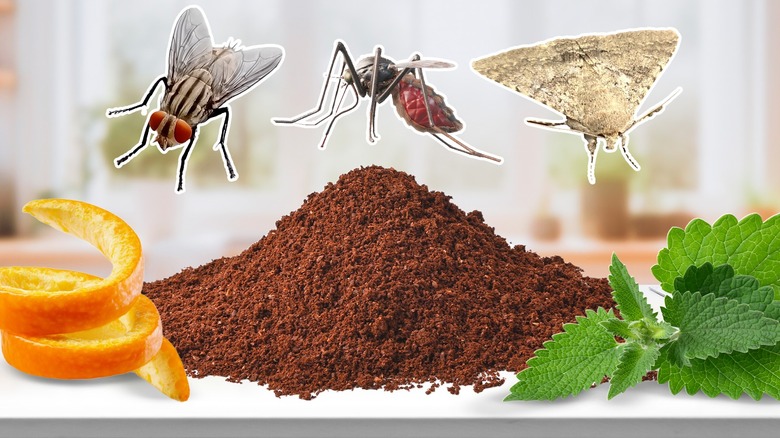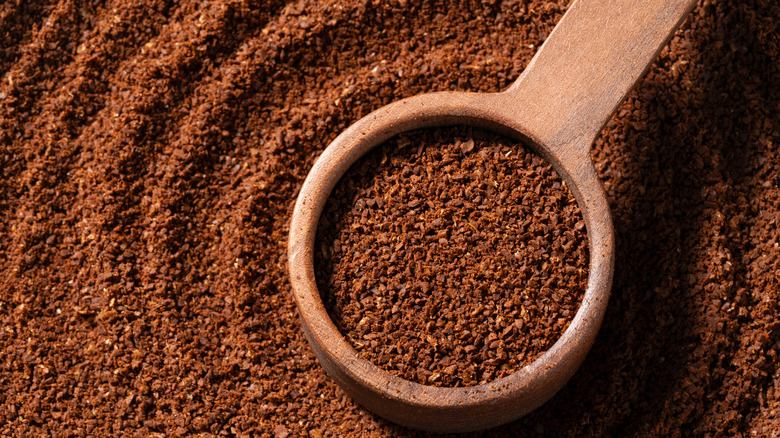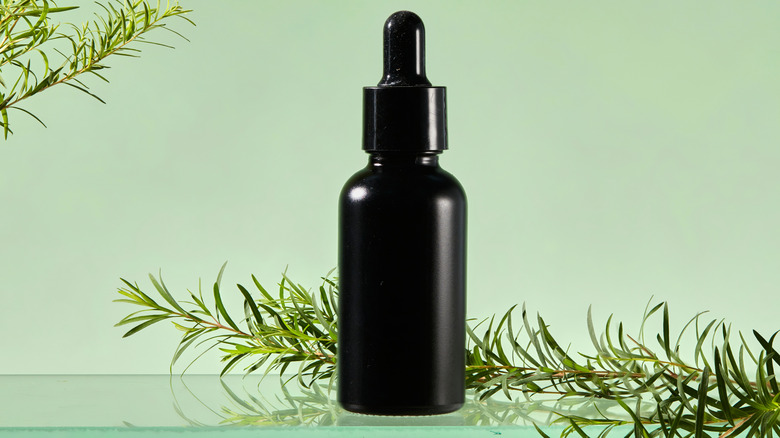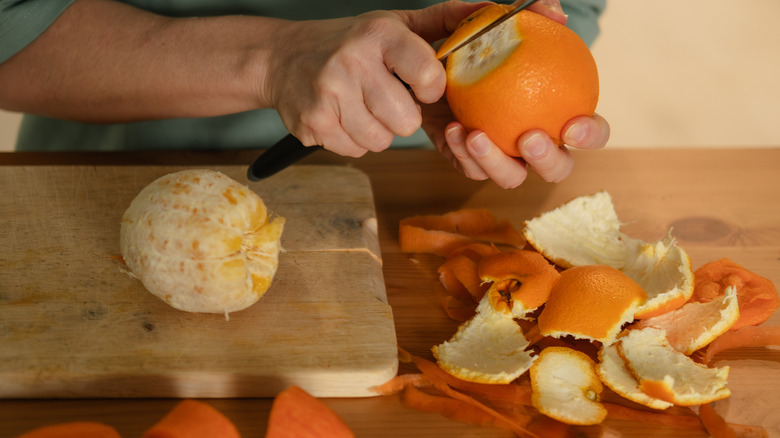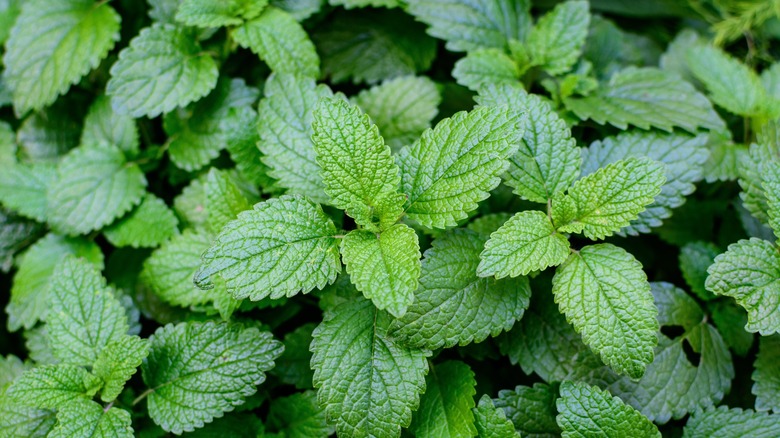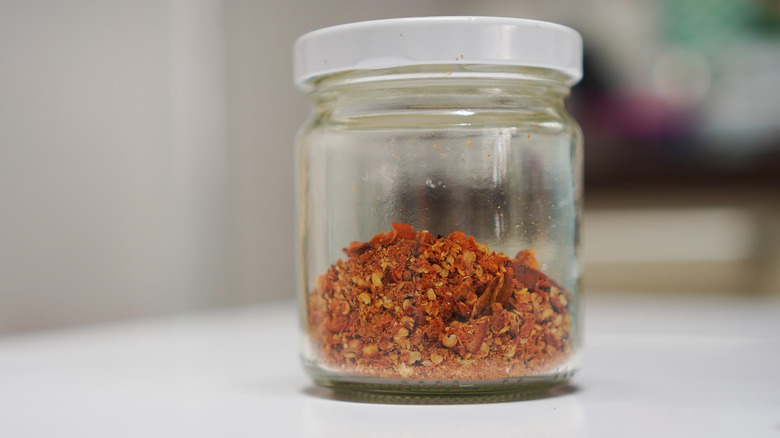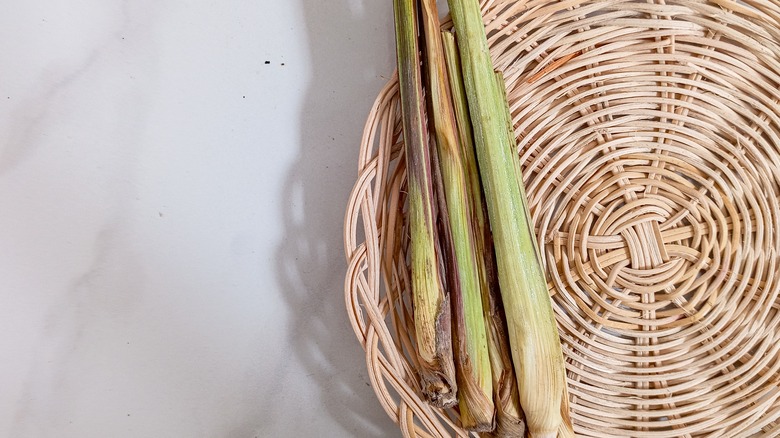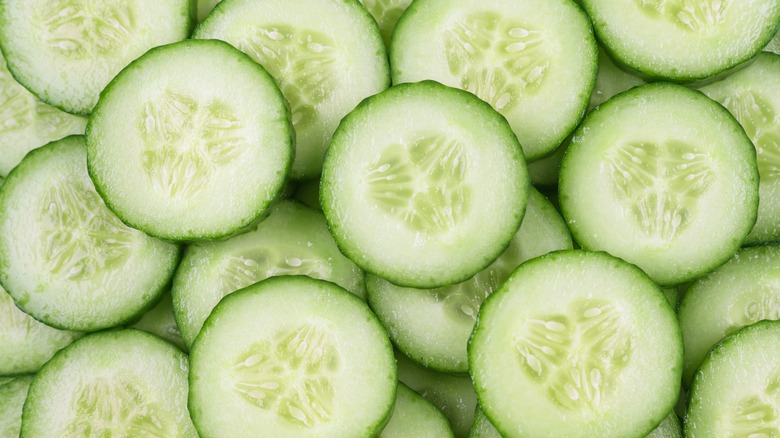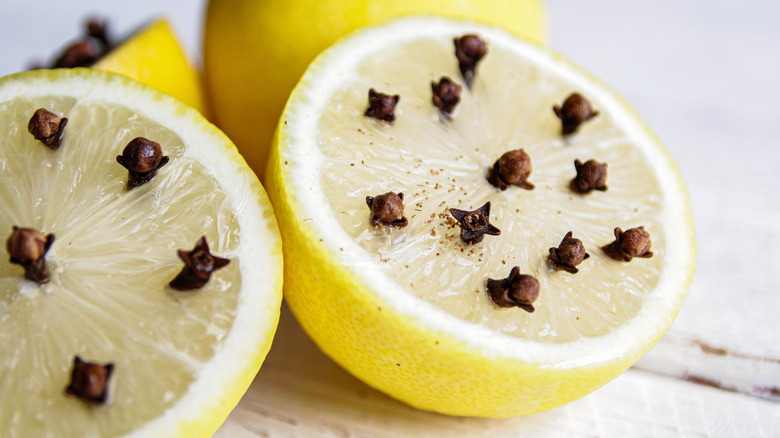12 Absolute Best Hacks For Keeping Bugs Out Of Your Kitchen
Just as we're getting into all the good summer feels, there's nothing worse than getting hit with the reality of what summer actually entails. Along with the heat, we welcome all sorts of bugs and pests like flies, mosquitoes and ants to the scene too. It's so wonderful to open up your kitchen windows and let in the fresh air, especially on hot days, but sadly, this means more pesky critters coming in to ruin your day. You don't want to get annoying things zooming past you while you're trying to cook lunch, or making some coffee, and you certainly don't want to reach your hand somewhere to find something tiny with many legs scurrying away.
The first step is to try not to attract bugs in the first place. This means keeping your kitchen clean and packing away any food, making sure not to leave anything exposed to the elements. Another thing people do is to place netting on the kitchen windows. While this is great for flies and mosquitos, it doesn't do much for the ground based creepy crawlies that come in from cracks in the wall.
Additionally, not everyone's kitchen windows are suitable for netting. No need to despair, as there are plenty of other ways to keep your kitchen a bug-free zone. You can use everything from common pantry staples, to specific plants, to little tricks you can do to keep away all the undesirables. Here are some of the absolute best hacks for keeping bugs out of your kitchen.
Toast some coffee grounds for mosquitos
There are some people in this world that know the suffering of being the one mosquitoes are attracted to. Somehow our blood is more delicious than others, and we end up getting numerous bites while others have none. It doesn't matter where you are, whether it's indoor or outdoors, mosquitos will find their way to you. If you are one of those people, then you need to try this coffee hack that keeps mosquitos out of the kitchen. It turns out that coffee makes for a great natural repellant, and mosquitos don't like the smell of it. The smell of the coffee overpowers other scents that mosquitos might be drawn to, interfering with their ability to find their victims.
Unfortunately, it's not as simple as making a cup of coffee and leaving it out, and even more sad for coffee lovers, it's not about you drinking it. It's about leaving some coffee grounds around. But the trick is that you want them to have an even more pungent smell, and this requires toasting and burning them. Luckily though, it's quite easy to do. Just sprinkle some coffee grounds onto a dry pan and turn up the heat until they get nice and toasty.
Don't worry, you don't have to waste your coffee in order to do this. You can use coffee grounds that you've already brewed coffee with. You'll just need to dry them out before toasting and they'll work a charm. Take note that using flavored coffee may not be as effective, as you want the coffee you're using to be as strong and earthy as possible.
Spray some diluted tea tree oil on your counters
Like coffee, tea tree oil has a strong odor that mosquitos and other bugs don't like. Studies have shown that tea tree oil has natural repellent properties, and can be an effective deterrent for a number of bugs, like flies, mosquitoes, ticks, and bees. In fact, reports have even found it to be more effective than DEET (N,N-diethyl-meta-toluamide), a chemical used in many mosquito repellents. It's a great choice for your kitchen because it will make your kitchen smell fresh and clean while keeping bugs away. While tea tree oil is totally natural, it's still really potent. It can be poisonous if ingested, and can cause allergic reactions. So use with caution, and make sure to dilute it with some water before spraying it anywhere.
If you buy a small bottle of tea tree oil, you'll see just how potent it is, as just a drop or two creates a really strong odor. This makes it perfect as a repellent. To use it on your counter tops, fill a spray bottle with water and add in a few drops of tea tree oil. Spray all over your kitchen surfaces. Leave to dry, and repeat as necessary. If the odor is too overpowering for you, you'll know to add a little less tea tree oil to your water solution next time.
Leave out some orange peels
Oranges are not only refreshing and delicious, they have another surprising quality. Stop throwing out your orange peels, as they're really useful at keeping away pests. Orange peels contain d- limonene, a natural pesticide that's often included in store bought bug repellants. While an orange peel smells good to us, it's harmful to fleas and flies. Plus, the smell repels ants, mosquitos, silverfish, cockroaches and ants. What more can you ask for?
So, leave some orange peels laying around your kitchen and enjoy a bug-free life. Keep in mind however that this will only work if the orange peels are fresh. Once they've dried out, they're no longer as effective and should be replaced. So get yourself a healthy supply of oranges to keep you full of vitamins all summer long, and to keep replacing your orange peels. Get juicing and have some delicious freshly squeezed orange juice every day, or if you're looking for creative ways to use up your orange juice, you can use it for everything from sauces, to brines for roast chicken.
Spray some white vinegar
You don't have to use complicated ingredients or head to specialized stores for bug repellant when there is a common household good that's just as effective. Your basic white vinegar in your kitchen cabinet can do wonders. Plus, it's a lot less harmful to you than many chemical bug sprays. And it's good news for the arachnophobic because it's even able to repel spiders.
Because of the high acid level of vinegar, it can cause damage to your skin or certain surfaces if you don't dilute it. Make a vinegar solution with one part water and one part vinegar, and spray this all over your kitchen, and especially in bug entry-points, to keep bugs away. The smell of vinegar may be quite strong for you at first, but it will fade away with time. The best part is that you can use this vinegar solution for both descaling your bathroom, and repelling bugs. You don't need to wipe away the vinegar solution once you've sprayed it. It will evaporate and while the ants will still be able to smell the traces of vinegar, you won't after it dries. The repelling effect lasts for a couple of days at least.
It's important to use white vinegar and not a sweet smelling vinegar like apple cider vinegar which can actually attract flies. However, you can take advantage of that and use apple cider vinegar in a fruit fly trap. Add some apple cider vinegar to a jar with a couple of drops of dish soap. Cover the jar with plastic wrap, and make a few holes in the cover for flies to be able to get in. They'll be drawn in by the smell of the vinegar, but the dish soap causes the flies to sink.
Keep some cinnamon sticks in your fruit bowl
For many people, summer is the best time of the year to eat an abundance and variety of fruit. Summer is when we get to pick from more than just a couple of fruits on offer as it's the season of watermelon, peaches, nectarines, cherries, melons, apricots, and more. Filling up your fruit basket with these fruits can make you feel happy and fill your kitchen with a fruity aroma. Sadly, this yummy smell is also loved by fruit flies. Your fruit bowl will likely attract a number of fruit flies,especially if your fruit is really ripe. One way to combat this is by placing cinnamon sticks in your fruit bowl. It couldn't be any better, instead of spraying chemical bug sprays and worrying it will contaminate your food, you're just adding another natural and nice smelling ingredient to the mix, but getting rid of the problem while doing so.
Cinnamon sticks contain something called eugenol. It's the compound that gives cinnamon its signature scent, and while we love it, fruit flies detest it. Not only will it keep fruit flies away, but it will also disrupt their ability to communicate with each other. All you need to do is place a couple of cinnamon sticks among your fruit and the results should be pretty much immediate. Sticks are more functional to use than powder because cinnamon powder is so fine, it can easily blow away. However, if you don't have sticks and there's not a lot of wind or breeze, powder can do the job. Lay out some powder around the bowl and even around your window sill.
Get some lemon balm
You may not be super familiar with lemon balm, as it's one of the lesser known herbs compared to things like basil, mint, and cilantro. It's a good one to get to know though, because it's a wonderfully scented herb that's great to keep in your kitchen. Not only is it a tasty herb to use in salads, or for things like cocktail or ice-cream garnishes, but it also helps to keep bugs away. Lemon balm is a kind of mix between the scent of mint and lemon, and if that hasn't sold you already, it also has citronellal, which is a compound often used to repel bugs.
The citronellal scent emitted in the plant is pleasant to us, but intolerable to bugs like mosquitos and gnats. While some people even rub the leaves on their skin, keeping a small lemon balm plant in your kitchen is useful for a number of reasons. It will naturally repel bugs, be useful in food and drink applications, and also add a pretty green element to your kitchen. What's not to love?
Make a cayenne pepper solution to deter ants
There are certain months of the year where ants attack my kitchen and there's no amount of cleaning that will get rid of them. This is a period where it becomes stressful to eat anything or use my kitchen normally, as any tiny crumb will cause swarms of ants to invade. Thankfully, there are ways around this that don't involve moving out completely. If you've got some cayenne pepper at home, you can make a solution with it that will help to keep ants away.
Interestingly enough, ants hate cayenne pepper. The smell works as an irritant to ants, and it disrupts the scent trails they leave behind for other ants to follow, making it an effective deterrent. To make a cayenne pepper solution, mix some cayenne pepper powder into some water and fill up an empty spray bottle with it. Then spray all over your kitchen surfaces, floors, and especially in any cracks in the wall that ants may be coming from. Leave this solution for as long for at least a day for it to be effective, then clean it up with a damp cloth. This isn't a permanenet solution though, and you will need to repeat it if the ants come back. Just make sure to wash your hands thoroughly if you get any cayenne pepper on them. Cayenne pepper is really strong and will burn your eyes if you rub them with hands that have handled any.
Place a lemongrass pot plant in your kitchen
This one may be known to many of you already, but lemongrass is a powerful natural bug repellent. In fact, if you've ever been on a trip to Thailand or Malaysia, it's likely you've come across this plant in every hotel and household to ward off mosquitos. Lemongrass has a strong citronella scent that mosquitoes don't like. If you're not sure what lemongrass smells like, just think of the smell of citronella candles or spray.
Keeping a lemongrass pot plant in your kitchen has numerous benefits. It will naturally repel mosquitos, while giving your kitchen a refreshing perfume smell. You can also use the plant to boil some lemongrass tea, or mince some up for Thai-inspired marinade for your cooking. It may not be as easy to buy fresh lemongrass in your mainstream grocery store, but a trip to a plant nursery to an Asian grocery store might help you find some.
Spray some garlic water around
Hanging garlic around a house can stir up images of vampires and the paranormal. But vampires aren't the only "blood-suckers" that garlic can deter, as they work on mosquitoes too, among other pests. Garlic is another food with a strong smell, and this helps to mask the odors that bugs are attracted to. Garlic is great to use because it's harmless to us and our plants, so we don't have to worry about anything being negatively affected by it. The only thing is that we will have to put up with the smell of garlic ourselves, in order to use it as a bug repellent.
To make the best use of garlic in our kitchen, it's best to make some garlic water. This entails crushing a load of garlic and mixing it with water to form a sort of milky garlic mixture. Leave this mixture overnight so that the garlic has time to really infuse with the water, and then strain the garlic pulp when you're ready to use it. The water left behind can be sprayed around on your kitchen counters and the windows. The garlic solution doesn't need to be cleaned up after. It will evaporate and the smell will fade away, while also cleaning and disinfecting your surfaces. If you find the garlic smell unpleasant, you can add a couple of drops of an essential oil that you like into the solution to help mask the smell.
Cucumber slices are for more than just your glass of water
Ants are attracted to all types of food, and anything from bread crumbs, to sugar, to spilled juice will have them lining up to get a taste. Surprisingly, there is a food that ants don't like and that's cucumber. That's right, the juicy, green vegetable you like to snack on or add to your salads or water are actually a natural ant repellant. It turns out ants find the smell repugnant and it keeps them away.
Slice up some cucumber and place them in all the spaces that you might think ants are coming from. This can be in the corners of your kitchen, or along the wall by the sink. Make sure to change out your cucumbers before they start decomposing or you may have bad smells and other pests to worry about.
Keep bay leaves in your pantry
Another place that bugs like to show up is in packets of flour. There's little as gross and opening a packet of flour to start baking some bread, or a cake, to find dark, beady little creatures in there. It's one of the most disappointing things, and it can feel like a huge waste of food to chuck out the flour, or even a bag of rice that's been infested. Luckily, you can use another food item to prevent this from happening. Bay leaves to the rescue. Bay leaves not only perfume certain foods like a spicy sauce, or broth, they can also help to keep away things like cockroaches, ants, weevils, and flies.
Add a bay leaf or two inside your jars, containers, or packets of dried goods. If you're worried about the smell of bay leaf transferring into the food, you could also just place a few leaves around the shelves and cupboards that you keep the food in. A couple of bay leaves scattered around could be the reason you don't have to discard foods for a long time. If they get too dry and lose their aroma, replace them to keep the same anti-bug effect.
Place whole cloves in lemons
Growing up in my household, there was not a summer where I didn't stumble upon the strange sight of lemon halves pierced with whole cloves. Each kitchen corner would have this unlinkley combination and my mom would explain to me that it was to keep away the flies. Growing up, I kept this habit going, and have had to explain to visitors and numerous skeptics that through the years, I've managed to effectively keep away flies. When this fruit and spice combo is out, flies do not enter my kitchen.
It turns out that the powerful scent created when whole cloves are combined with lemon is able to deter flies. It seems that both these ingredients have a natural bug repellant in them, but when combined, become even more potent. The limonene in lemons and the eugenol in cloves work together to keep flies away. It's really simple to do. Just cut some lemons into halves, and gently pierce the insides of the lemon with your whole cloves. The shape of cloves allow them to naturally stick out of the lemons and not fall out. Then place these lemon halves around window sills, near fruit bowls, or anywhere you think flies might be able to come in through.
